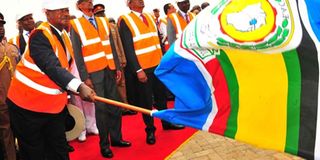EAC outlines priorities for 2014

L-R: Presidents Yoweri Museveni (Uganda), Paul Kagame (Rwanda) Uhuru Kenyatta (Kenya) commission the Mombasa port last year. The regional governments have vowed to speed up the implementation of most projects under the East African Community.
What you need to know:
Top on the agenda are infrastructure, defence, a common foreign policy, customs union, a single tourist visa and the use of national IDs.
Monitor Correspondent
NAIROBI.
As the new year starts, the EAC is preparing to roll out integration projects that are likely to test the region’s unity and commitment.
At least five projects are set for implementation this month, among them a common defence, security and foreign policy that will see Kenya, Uganda, Rwanda, Burundi and Tanzania jointly strengthen their military capabilities for conflict prevention and crisis management.
Mr Simiyu Werunga, the director of the African Centre for Security and Strategic Studies, said having a common EAC defence policy will ensure that partner states rarely fight among themselves.
Work as a team
Under the arrangement, the armed forces of partner states are expected to work as a team in maritime patrols to ensure that the region’s international waters are free of piracy.
Kenya, Uganda and Rwanda are expected to sign the defence, security and foreign policy pact this month, and establish common foreign policy by October.
Kenya, Rwanda and Uganda already launched the Single Customs Territory (SCT) last week.
Mr Meshack Kipturgo, the managing director at freight logistics firm Siginon, said implementation of the SCT could reduce cargo clearing costs by half, since the transit bond fees along the corridor will be scrapped.
EAC member states had set a January 2014 deadline to implement the single tourist visa and to facilitate the use of IDs as travel documents for its citizens. By January 1, Rwandans were already reportedly using their national ID’s to cross into Uganda.
This year, member states are expected to fast-track the implementation of the political federation, the Customs Union, and the Common Market Protocol.
They are also expected to conclude the ratification of the East African Monetary Union Protocol by July 2014. It is expected to be implemented in 10 years by member states. The member states also plan to implement infrastructure projects focusing on energy, oil pipelines, railways, road and air services.
REGIONAL SECURITY CHIEFS MEET IN KIGALI
Defence and police chiefs from Uganda, Kenya and Rwanda met in Kigali on Tuesday to discuss a common defence and security pact that will help combat terrorism and cross-border crime in the three countries.
The pact will also put in place mechanisms to safeguard the regional infrastructure that the three countries plan to put in place, such as railway line and oil pipeline. The three-day meeting will lay ground for a meeting of Defence ministers who will scrutinise and endorse the document before the end of this month, as agreed by the respective Heads of State in October last year.
While opening the meeting, Rwanda’s Defence minister James Kabarebe said the region’s development must be accompanied with actions toward the creation of peace and security against cross-border crime and terrorism.
Rwanda’s Military spokesperson Joseph Nzabamwita said the security pact will pave way for joint defence operations against terror threats in any of the three countries.
By Ivan Mugisha, Monitor



